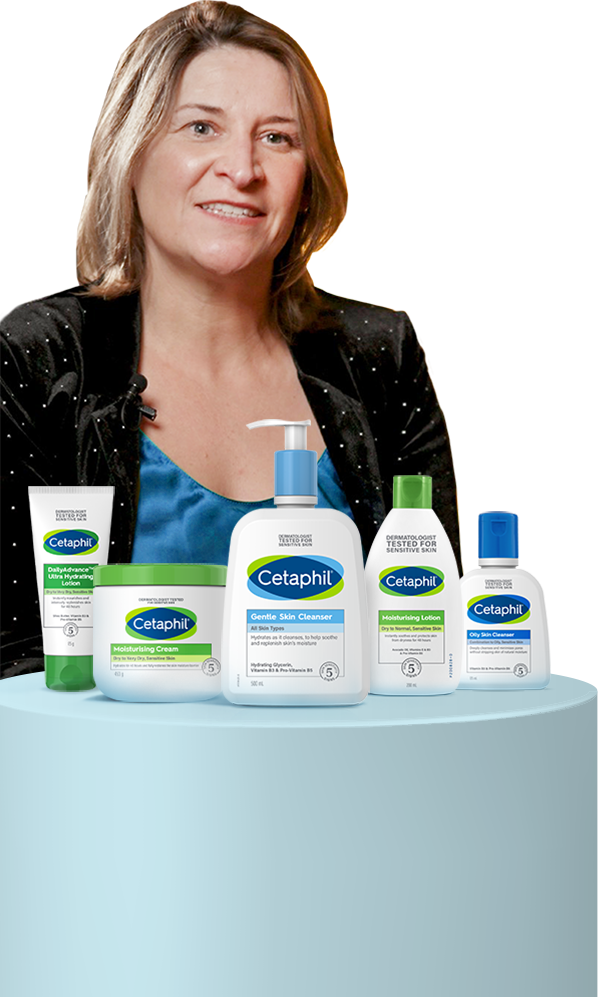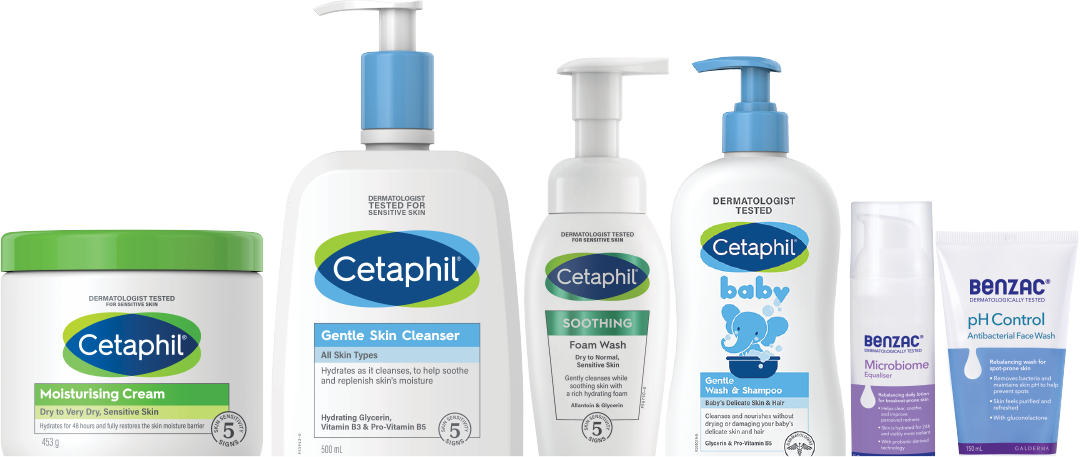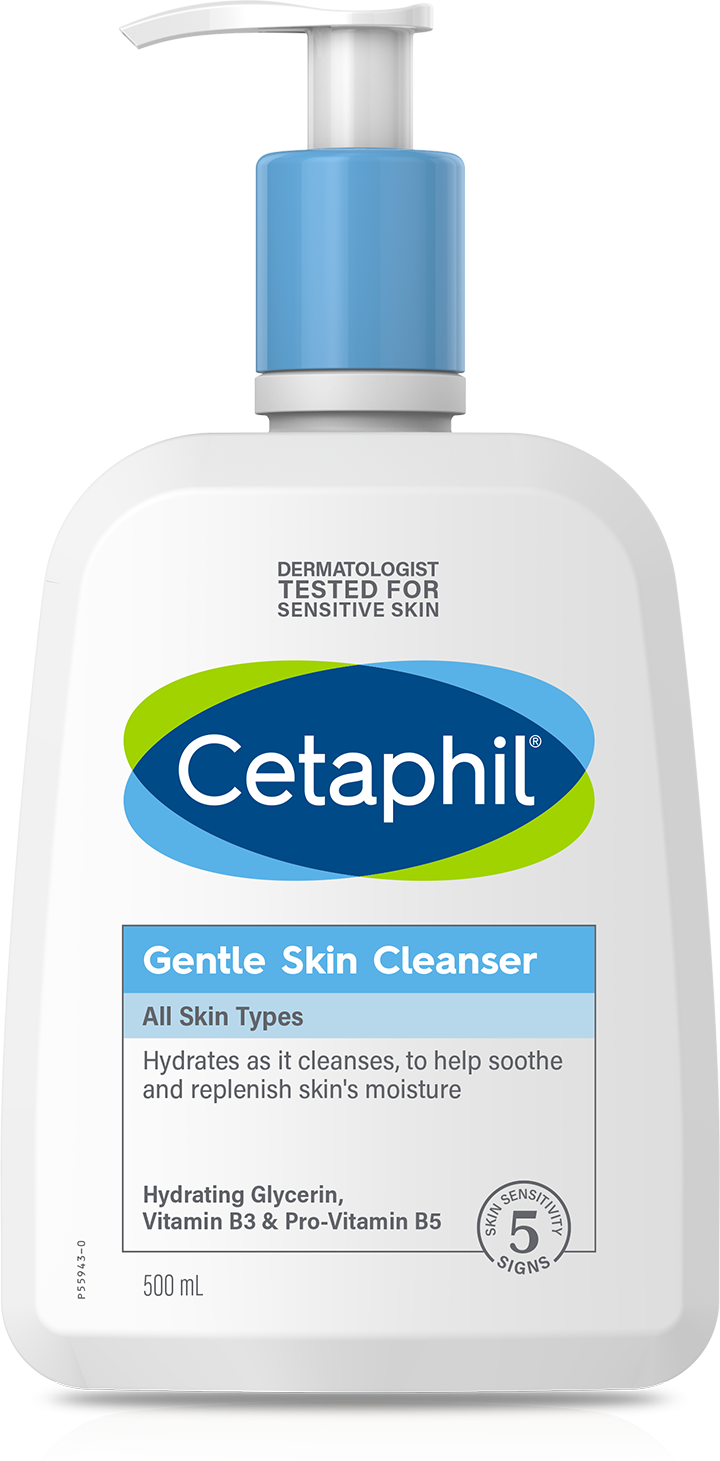
To Skinsense.
It is estimated that around 70% of people worldwide have some measure of sensitive skin.
While people have varying degrees of skin sensitivity, most experience sensory effects, such as tightness, dryness, roughness, and more.
YOUR SKIN REALLY IS
ADVANCED SKIN ANALYSER
SAMPLES


Global Head of Skin Science & Scientific Engagement,
Consumer Care Global Business Unit Galderma Sensitive Skin Care Faculty, Research Pillar Lead
Here are the answers!
Skin Health
Skin Health
Your skin health questions,
answered.
Acne is a skin disease that involves the interaction of multiple factors (genetic, hormonal, stress, diet, environmental factors, etc.) that result in the formation of comedones and the development of inflammation.
Four primary factors play a pivotal role in the formation of acne lesions: excess sebum production, abnormal keratinization, inflammation, and bacterial colonization (cutibacterium acnes).
Your skin health questions,
answered.
Dermocosmetics are an integral part of acne management. At Cetaphil, we recommend a holistic approach in four steps to optimize outcomes:
- Clean: Remove hair follicle plugs and residue & pollution to prevent obstruction
- Treat: Gain early control of the acne symptoms, prevent scarring and improve quality of life
- Moisture: Mitigate epidermal barrier impairment and its related skin sensitivity and irritation
- Protect: Use sunscreen to protect against UV radiation and help prevent residual hyperpigmentation
In case no improvement is observed, we recommend you consult your doctor in order to get personalised treatment.
Your skin health questions,
answered.
Cleaning is the first key step in the management of acne. However, it is not sufficient and we recommend the four step approach: Clean, Treat, Moisturise, and Protect.
Scientists believe that following a low-glycemic diet (fruits, vegetables, protein-rich foods, and wholegrain bread) may reduce acne, because this diet eliminates spikes in your blood sugar. When your blood sugar spikes, it causes inflammation throughout your body.
These spikes also cause your body to make more sebum, an oily substance in your skin. Both inflammation and excess sebum can lead to acne. Hence, a healthy balanced diet may improve your acne.
Nevertheless, keeping your skin clear requires more than a diet change. Using acne friendly skin care and acne medication helps to prevent new breakouts.
Your skin health questions,
answered.
Acne is a multifactorial skin disease that requires a specific routine to optimize outcomes. Excess sebum and dead skin cells which clog your pores play a key role in the formation of acne lesions.
The first step of Cetaphil’s holistic approach is to clean your skin (day and night), with a cleanser that targets oily and acne-prone skin to help remove excess oil and dead skin cells. In addition, you should regularly moisturise and protect your skin against UV radiation.
Your skin health questions,
answered.
Babies' skin is still developing and therefore thinner and more sensitive than adult skin. Their skin is more susceptible to infection, has a higher risk of heat loss, is more susceptible to chemical and thermal injury, and is highly permeable to topical agents that can produce toxicity.
Babies' sweat glands are less efficient, and their skin absorbs and releases moisture easily. Because of this, their bodies are much less thermoregulated (the function that regulates body temperature) than adults.
Baby skin contains less lipid (sebum) than adult skin and in addition, babies' skin produces less melanin than adults, which makes the skin more susceptible to UV radiation and thus more prone to sunburn.
During the first 3 months of life, desquamation (peeling skin) is more severe on the forehead due to increased epidermal turnover, but less severe on the cheeks and diaper area where the skin is easily irritated. Babies' skin has a lower pH than adult skin (the acidity of the skin protects against infection). This all means that your baby's skin needs more attention and pampering.
Your skin health questions,
answered.
You should apply an unscented moisturiser as often as necessary on your baby. Apply evenly to the whole body daily, at the first signs of dryness. Some babies’ require an application once or twice a day, while others with very dry skin will need it more often.
Thicker creams are more effective than lotions. Application immediately after washing while the skin is still damp, will increase the moisturizing effect. The application of a moisturiser on clean skin after every diaper change will protect the skin from diaper rash.
Your skin health questions,
answered.
Treatment of inflamed and broken skin consists of cleansing the area with a gentle, unscented cleanser formulated for baby skin. Rinse it off with lukewarm water, gently patting the skin dry and immediately apply an unscented, hypoallergenic skin moisturiser. For babies’ laundry, use a gentle detergent without any fabric softener.
Diaper rash causes skin to inflame and break in the diaper area. It can happen for many reasons, such as if diapers are too tight and rub against the skin, are left on for too long, or sometimes using an unfamiliar brand of diapers or baby wipes. Using harsh detergents, bleach or fabric softeners to launder babies’ clothes and diapers or treatment with antibiotics, introduction of a new food, can cause diarrhoea or aggravate skin.
Diaper rash usually clears up with simple at-home treatments, such as air drying the baby’s bottom or gently tapping it dry after washing, more frequent diaper changes, and application of barrier creams such as a zinc-oxide cream or mineral oil. If the diaper rash doesn’t get better within a few days, spreads further, becomes oozy, makes your baby cry in pain when it urinates or has a bowel movement, or if your baby develops fever, please consult a doctor.
Your skin health questions,
answered.
Exfoliation removes dead skin cells from the surface of the skin. These dead skin cells, combined with excess oil and debris, can lead to dull skin and breakouts.
Exfoliation is beneficial for all skin types, including sensitive skin. I recommend using gentle exfoliators only for sensitive skin and no more than once a week so you don't irritate and dry out your skin.
Your skin health questions,
answered.
Hormonal changes are known to trigger skin sensitivity. About 42%of premenopausal women (who have menstrual cycles) experience increased skin sensitivity in the days leading up to and during menstruation, according to a 2017 study published in a scientific journal. Nearly 32% of perimenopausal, menopausal and postmenopausal women reported that their overall skin concerns were worse than during their normal cycle.
During these extraordinary times, we recommend that you take extra care to protect yourself from external factors that trigger sensitive skin, especially sun exposure, and continue your skincare routine as usual.
Your skin health questions,
answered.
It can be difficult to identify all the triggers for sensitive skin, especially when our skin is exposed to so many different things every day! Sensitive skin symptoms can be caused by internal and external factors. According to a recent global literature review, the top external triggers of skin sensitivity are cosmetics, humid air, air conditioning, temperature fluctuations, heat, water, pollution, dry air, cold wind, and sun exposure. Internal factors such as diet (spicy food, alcohol), hormonal changes, high stress and emotions are the main triggers for sensitive skin.
Your skin health questions,
answered.
Using multiple moisturisers or different cleansers at the same time can be unpredictable.
Whether you choose to mix it up, or stick to one, practise a simple and satisfactory routine to avoid bad surprises.
Your skin health questions,
answered.
Applying sunscreen to dry skin after gentle cleansing is often recommended for optimal UV protection. It's important to reapply sunscreen at least every 90 minutes to 2 hours, and at least 15 to 30 minutes before going outside.
Reapplication is important to maintain protection, especially after sweating, swimming, or drying off.
Your skin health questions,
answered.
Applying sunscreen to dry skin after gentle cleansing is often recommended for optimal UV protection. Also, it's important to remember a general best practice when using sunscreen: reapply sunscreen at least every 90 minutes to 2 hours, and at least 15 to 30 minutes before going outside. Reapplication is important to maintain protection, especially after sweating, swimming, or drying off.
If relevant, take note of these pointers:
- Do not spend too long in the sun, even with sunscreen on
- Reducing sunscreen use significantly reduces protection
- Overexposure to the sun can be a serious health hazard—keep babies and young children out of direct sunlight
- Apply generously before going outdoors
Your skin health questions,
answered.
Here are some tips:
- Apply product to test areas on sensitive skin that are less visible (eg: bottom of arm or crook of elbow.)
- Leave products on your skin as long as you normally would
- If you don’t have a skin reaction after 7 to 10 days of normal frequency of application, the product should be safe
- If you develop a skin reaction, gently wash the product off as soon as possible, and don’t use it again. Apply a cool compress to relieve your skin, if needed. See a dermatologist to help manage your symptoms.


